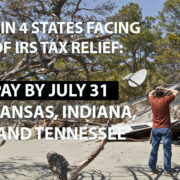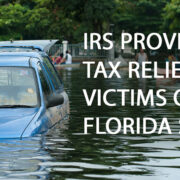Storm victims in 4 states facing expiration of IRS tax relief: File and pay by July 31; parts of Arkansas, Indiana, Mississippi and Tennessee.
Individuals and businesses in parts of four states where Federal Disaster Relief was announced are facing a deadline of July 31, 2023 to file their 2022 federal income tax returns and make tax payments. You can file an extension to get additional time to October 16, 2023 to file your tax returns but it does not extend the time to pay.
Areas With July 31, 2023 Deadlines:
The IRS announced on April 3, 2023 that March 31 Storm victims in parts of Arkansas now have until July 31, 2023 to file various federal individual and business tax returns and make tax payments.
The IRS announced on April 18, 2023 that March 31/April 1 Storm victims in parts of Indiana now have until July 31, 2023 to file various federal individual and business tax returns and make tax payments.
The IRS announced on March 28, 2023 that March 24 and 25 Storm victims in parts of Mississippi now have until July 31, 2023 to file various federal individual and business tax returns and make tax payments.
The IRS announced on April 10, 2023 that March 31 Storm victims in parts of Tennessee now have until July 31, 2023 to file various federal individual and business tax returns and make tax payments.
Other Areas Having Extended Deadlines:
The IRS announced on January 10, 2023 that California storm victims have until May 15, 2023 to file various federal individual and business tax returns and make tax payments. Subsequently on January 13, 2023 the California Franchise Tax Board (“FTB”) announced that California storm victims also have until May 15, 2023 to file various California individual and business tax returns and make tax payments. Then on February 24, 2023 the IRS announced that their extended deadline for eligible California storm victims would now be extended to October 16, 2023.
IRS Tax Relief Details
The IRS is offering this relief to any area designated by the Federal Emergency Management Agency (FEMA), as qualifying for individual assistance.
For Arkansas – Currently, relief is available to affected taxpayers who live or have a business anywhere in Cross, Lonoke and Pulaski counties in Arkansas.
For Indiana – Currently, relief is available to affected taxpayers who live or have a business anywhere in Allen, Benton, Clinton, Grant, Howard, Johnson, Lake, Monroe, Morgan, Owen, Sullivan and White counties in Indiana.
For Mississippi – Currently, relief is available to affected taxpayers who live or have a business anywhere in Carroll, Humphreys, Monroe and Sharkey counties in Mississippi.
For Tennessee – Currently, relief is available to affected taxpayers who live or have a business anywhere in Cannon, Hardeman, Hardin, Haywood, Lewis, Macon, McNairy, Rutherford, Tipton and Wayne counties in Tennessee.
For California – Currently, relief is available to affected taxpayers who live or have a business anywhere in Colusa, El Dorado, Glenn, Humboldt, Los Angeles, Marin, Mariposa, Mendocino, Merced, Monterey, Napa, Orange, Placer, Riverside, Sacramento, San Bernardino, San Diego, San Joaquin, San Luis Obispo, San Mateo, Santa Barbara, Santa Clara, Santa Cruz, Solano, Sonoma, Stanislaus, Sutter, Tehama, Ventura, Yolo, and Yuba counties.
The current list of eligible localities is always available on the disaster relief page on IRS.gov. The declaration permits the IRS to postpone certain deadlines for taxpayers who reside or have a business in the disaster area.
The additional relief postpones until October 16, 2023 (California) or July 31, 2023 (Mississippi, Arkansas, Tennessee and Indiana), various tax filing and payment deadlines, including those for most calendar-year 2022 individual and business returns. This includes: individual income tax returns, originally due on April 18, 2023 (May 15, 2023 per the previous IRS announcement); various business returns, normally due on March 15th and April 18th of 2023; and returns of tax-exempt organizations, normally due on May 15, 2023.
Among other things, this means that eligible taxpayers will also have until October 16, 2023 (California) or July 31, 2023 (Mississippi, Arkansas, Tennessee and Indiana) to make 2022 contributions to their IRAs and health savings accounts.
In addition, farmers who choose to forgo making estimated tax payments and normally file their returns by March 1, 2023 (May 15, 2023 per the previous IRS announcement) will now have until October 16, 2023 (California) or July 31, 2023 (Mississippi, Arkansas, Tennessee and Indiana), to file their 2022 return and pay any tax due.
The October 16, 2023 (California) or July 31, 2023 (Mississippi, Arkansas, Tennessee and Indiana) deadline also applies to the estimated tax payment for the fourth quarter of 2022, originally due on January 17, 2023. This means that taxpayers can skip making this payment and instead include it with the 2022 return they file, on or before October 16, 2023 (California).
The October 16, 2023 (California) or July 31, 2023 (Mississippi, Arkansas, Tennessee and Indiana) deadline also applies to 2023 estimated tax payments, normally due on April 18th, June 15th and September 15th of 2023. It also applies to the quarterly payroll and excise tax returns normally due on January 31st, April 30th and July 31st of 2023.
FTB Tax Relief Details
On March 10, 2023 the FTB announced that it too would follow IRS allowing taxpayers impacted by 2022-23 winter storms to have an extension to October 16, 2023 to file individual and business tax returns and make certain tax payments. This includes:
- Individuals whose tax returns and payments are due on April 18, 2023.
- Quarterly estimated tax payments due January 17, 2023, March 15, 2023, April 18, 2023, June 15, 2023, and September 15, 2023.
- Business entities whose tax returns are normally due on March 15 and April 18.
- Pass-through entity (PTE) elective tax payments due on March 15, 2023 and June 15, 2023.
However, the postponement of time to file and pay does not apply to residents and businesses located in the following 5 counties: Imperial, Kern, Lassen, Plumas, and Sierra. Additionally, if your principal residence or place of business is in Modoc or Shasta counties, income tax filing and payment deadlines that fall between February 21, 2023, and August 15, 2023, are due August 15, 2023.
Residents and businesses located in the above 5 non-qualifying counties must file and pay by the normal established deadlines. This includes:
- Individuals whose tax returns and payments are due on April 18, 2023.
- Quarterly estimated tax payments due January 17, 2023, March 15, 2023, April 18, 2023, June 15, 2023, and September 15, 2023.
- Business entities whose tax returns are normally due on March 15 and April 18.
- PTE elective Tax payments due on March 15, 2023, and June 15, 2023.
Tax Planning Tip
Individuals and businesses in a federally declared disaster area who suffered uninsured or unreimbursed disaster-related losses can choose to claim them on either the return for the year the loss occurred (in this instance, the 2023 return normally filed next year), or the return for the current year (2022).
Be sure to write the FEMA declaration number on any return claiming a loss. That number being: “FEMA-3591-DR” for California or “4697-DR” for Mississippi or “4698-DR” for Arkansas or “4701-DR” for Tennessee or “4704-DR” for Indiana.
When filing a California return claiming a loss, be sure to write the name of the disaster in blue or black ink at the top of your tax return to alert FTB.
Importance To Preserve Records
Keep in mind that the IRS has up to three years to select a tax return for audit. The FTB has up to four years to select a tax return for audit. In some cases this period is extended to six years. When a taxpayer is selected for audit, the taxpayer has the burden of proof to show that expenses claimed are properly deductible. Having the evidence handy and organized makes meeting this burden of proof much easier.
Essential Records to Have for a Tax Audit
If you are getting ready for a tax audit, one of the most important things to do is gather and organize your tax records and receipts. There’s a good chance that you have a large amount of documents and receipts in your possession. No matter how organized you are, it can be a daunting task to collect the right pieces and make sure that you have them organized and handy for the audit conference.
We have seen many tax audits that hinge on whether or not the taxpayer can provide proper documentation for their previous tax filings. A tax lawyer in Orange County or elsewhere can make sure that the documentation is complete and proper. By submitting this to your tax attorney in advance of the audit, your tax attorney can review your documentation and determine if there are any gaps that need to be addressed before starting the dialogue with the IRS agent.
So what are the most essential tax records to have ahead of your audit? Here are a few must-have items:
- Any W-2 forms from the previous year. This can include documents from full-time and part-time work, large casino and lottery winnings and more.
- Form 1098 records from your bank or lender on mortgage interest paid from the previous year.
- Records of any miscellaneous money you earned and reported to the IRS including work done as an independent contractor or freelancer, interest from savings accounts and stock dividends.
- Written letters from charities confirming your monetary donations from the previous year.
- Receipts for business expenses you claimed.
- Mileage Logs for business use of vehicle.
- Entertainment and Travel Logs for business
Tips On Reconstructing Records
Reconstructing records after a disaster is important for several reasons including insurance reimbursement and taxes. Most importantly, records can help people prove their disaster-related losses. More accurately estimated losses can help people get more recovery assistance like loans or grants.
Whether it’s personal or business property that has been lost or destroyed, here are some steps that can help people reconstruct important records.
Tax records
Get free tax return transcripts immediately using the Get Transcript on IRS.gov or through the IRS2Go app. Tax return transcripts show line-by-line the entries made on your Federal income tax returns. The most three recent tax years are available.
Financial statements
People can gather past statements from their credit card company or bank. These records may be available online. People can also contact their bank to get paper copies of these statements.
Property records
- To get documents related to property, homeowners can contact the title company, escrow company or bank that handled the purchase of their home or other property.
- Taxpayers who made home improvements can get in touch with the contractors who did the work and ask for statements to verify the work and cost. They can also get written descriptions from friends and relatives who saw the house before and after any improvements.
- For inherited property, taxpayers can check court records for probate values. If a trust or estate existed, taxpayers can contact the attorney who handled the trust.
- When no other records are available, people should check the county assessor’s office for old records that might address the value of the property.
- Car owners can research the current fair-market value for most vehicles. Resources are available online and at most libraries. These include Kelley’s Blue Book, the National Automobile Dealers Association and Edmunds.
Develop And Implement Your Backup Plan
Do not wait for the next disaster to come for then it may be too late to retrieve your important records for a tax audit or for that matter any legal or business matter. And if you do get selected for audit and do not have all the records to support what was claimed on your tax returns, you should contact an experienced tax attorney who can argue the application of your facts and circumstances to pursue the least possible changes in an audit.
The tax attorneys at the Law Offices Of Jeffrey B. Kahn, P.C. located in Orange County (Irvine), Los Angeles and elsewhere in California are highly skilled in handling tax matters and can effectively represent at all levels with the IRS and State Tax Agencies including criminal tax investigations and attempted prosecutions, undisclosed foreign bank accounts and other foreign assets, and unreported foreign income. Also if you are involved in cannabis, check out what a cannabis tax attorney can do for you. And if you are involved in cryptocurrency, check out what a bitcoin tax attorney can do for you.










